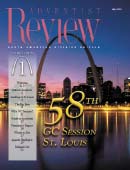 |
||
This is not a contradiction. Freedom of choice is God's gift for all human beings. It is a beautiful expression of His character and His love for us. Our Creator gave us dignity and intelligence, and He loved us enough to allow us to choose. At a time when religious fanaticism produces intolerance, persecution, and death, the world needs to hear a strong voice saying that this is not God's way. That conviction prompted the pioneers of our church to charter the International Religious Liberty Association (IRLA) in 1893 and publish the first issue of Liberty magazine in 1905. A strong Public Affairs and Religious Liberty Department (PARL) is necessary to defend and protect ourselves and others and to affirm God's character and His love for all humankind. We Are a Minority There may be 75,000 of us in the America's Center on Sabbath, July 9. While it will be great to be together, we must remember that our church makes up less than 1 percent of the world population. As a very small minority, we will continue to face prejudice, hostility, unfair legislation, and media bias. Our work and our institutions may be affected at any time. A law may be voted that will create problems for us. Our department needs to be proactive in representing and defending the church at the governmental level and before religious leaders and international organizations. If we are unprepared and unqualified, the result could be a disaster. At each level of our organization we should be aware of that challenge. What Have We Done?
PARL continues to maintain high-level interreligious relations under the leadership of Bert B. Beach. We had dialogues with the World Alliance of Reformed Churches and the Salvation Army. Beach was an observer in several meetings organized by the World Council of Churches. Dr. Eugene Hsu represented the church at the Conference of Secretaries of the Christian World Communions.
From our new office near the Capitol in Washington, D.C., Attorney James Standish and a group of interns have maintained a high level of activity in the world's political capital. Our legal counsel, Attorney Mitchell A. Tyner, has defended Sabbathkeepers in the United States and around the world. Sponsored by the General Conference, IRLA has become one of the most respected nonsectarian associations in the field of religious freedom. In the past five years the IRLA organized 10 international congresses and six meetings of experts, and it initiated the Washington Coalition on International Religious Freedom. With the support of the Southern Asia-Pacific Division, the Fifth IRLA World Congress was held in Manila in 2002. Gianfranco Rossi, a well-known expert in Geneva and an IRLA representative, is active during meetings of the Human Rights Commission. PARL publishes Fides et Libertas (Faith and Liberty) each year; produces the television program Faith and Freedom; and operates several Web sites.2 Country Visits New Positions and Honors Several PARL directors received medals and honors in recognition of their service: Viorel Dima from the president of Romania; Maurice Verfaillie from the Spanish government; Bert B. Beach from the president of Poland; John Graz from the president of Romania; Gianfranco Rossi from the International Association for Religious Freedom. Such examples show how the work of PARL has been appreciated outside of our church. Five Concerns 2. More and more Adventist students and employees face Sabbath problems alone, and some compromise their faith. 3. In many countries the church has no representatives before the regional and national governments. 4. Antiproselytism legislation is coming in several countries, and it will affect us if we do not try to prevent it. 5. Adventist leaders are not proactive enough when it comes to improving religious freedom and changing the status quo. Our world will not become more open to religious minorities. Our members are on the front line, and they will be the first affected by restrictions on religious freedom. They will need to stay faithful when threatened by job loss or expulsion from public schools. They need to know that the church takes their problem seriously and is willing to provide competent advice and spiritual support. How Can We Help You? In 1999 the only Adventist church building in Turkmenistan was destroyed by the government. Our church was declared illegal, and the pastor and members were persecuted. Working closely with the Euro-Asia Division, we organized a letter-writing campaign, writing to governments and to embassies around the world. Jonathan Gallagher represented us at the United Nations. Attorney James Standish worked through the U.S. Congress, U.S. Department of State, the Organization for Security and Cooperation in Europe, and the U.S. Commission. I had regular contacts with our pastor in Turkmenistan and with the Euro-Asia Division. Our members and their pastor were harassed, and they had no place to worship. In 2004, under international pressure, the government of Turkmenistan decided to register a few religious groups. Our church was the first to be registered. This did not happen because of the number of our members. According to one of the best experts on Central Asia, it happened because of our international connections. We are a minority; yet if one of us is persecuted, persecutors have to know that we are a world family composed of millions of brothers and sisters. The banner of truth and religious freedom has been committed
to our hands, and PARL is prepared to serve you.
_________________________ |
 |
 |



 The participation of Jonathan Gallagher, Viola Hughes, and volunteers
in meetings and commissions at the United Nations has given us an effective
presence there, particularly at the United Nations Commission on Human Rights.
The participation of Jonathan Gallagher, Viola Hughes, and volunteers
in meetings and commissions at the United Nations has given us an effective
presence there, particularly at the United Nations Commission on Human Rights.